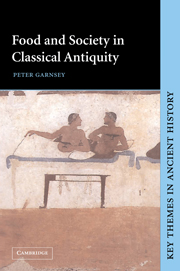Book contents
- Frontmatter
- Contents
- List of illustrations
- Acknowledgements
- Abbreviations
- Preface
- Introduction: Food, substance and symbol
- 1 Diet
- 2 Food and the economy
- 3 Food crisis
- 4 Malnutrition
- 5 Otherness
- 6 Forbidden foods
- 7 Food and the family
- 8 Haves and havenots
- 9 You are with whom you eat
- Conclusion: Choice and necessity
- Bibliographical essay
- Bibliography
- Index
6 - Forbidden foods
Published online by Cambridge University Press: 05 June 2012
- Frontmatter
- Contents
- List of illustrations
- Acknowledgements
- Abbreviations
- Preface
- Introduction: Food, substance and symbol
- 1 Diet
- 2 Food and the economy
- 3 Food crisis
- 4 Malnutrition
- 5 Otherness
- 6 Forbidden foods
- 7 Food and the family
- 8 Haves and havenots
- 9 You are with whom you eat
- Conclusion: Choice and necessity
- Bibliographical essay
- Bibliography
- Index
Summary
PRELIMINARIES
Although humans are omnivores, some potential foods are in practice unavailable, while others that are available, edible and nutritious are rejected or not even considered as food, food for humans that is. Among edible things treated as unfoods, some are rejected for reasons of taste, but will be eaten if necessary, in emergencies – they are famine foods – whereas others are forbidden as food. They are taboo. In this chapter I ask why it is that some social groups and communities impose food restrictions on their members, while others, the taboo against cannibalism excepted, do not. The Israelites of the Old Testament and beyond, and certain religious and philosophical groups within Greek and Roman pagan society, followed restrictive dietary rules, whereas Graeco-Roman society in general was ‘tolerant’ in this respect. Of course, food consumption is only one of the possible areas of restrictive regulation, and the range of prohibited practices will vary from society to society. As Freud observed, Greeks and Romans (as well as Jews) had their equivalents of the Polynesian taboo, in agos, sacer (compare the Jewish Kodaush), and taboo restrictions did penetrate to some extent their social, political and legal structures, as well as regulating sexual relations. But this did not happen on anything like the Jewish scale. Nor did Graeco-Roman societies lack altogether the concept of physiological pollution, the belief that contact with certain physical products or the performing of certain physical functions – including eating particular foods – might be dangerous for the society and the individual. The normal response among such communities, however, was to regulate the behaviour of only a few individuals with priestly functions.
- Type
- Chapter
- Information
- Food and Society in Classical Antiquity , pp. 82 - 99Publisher: Cambridge University PressPrint publication year: 1999



